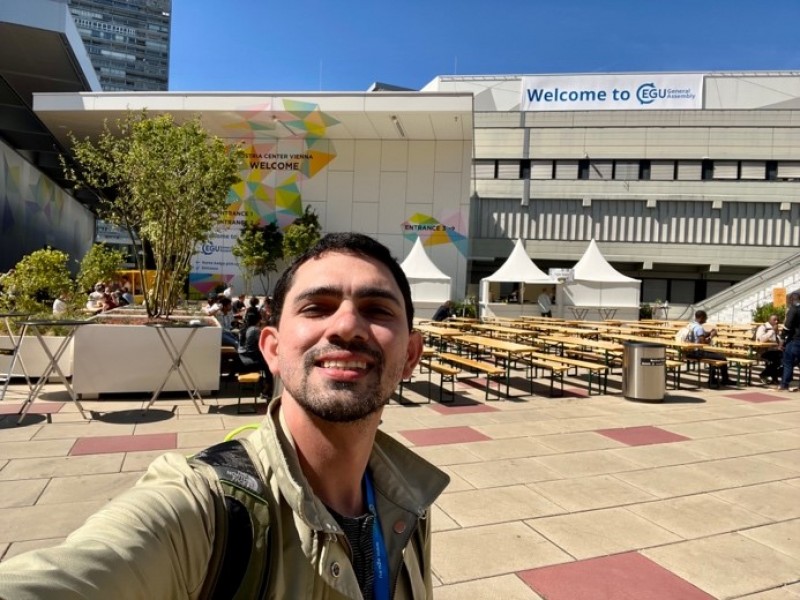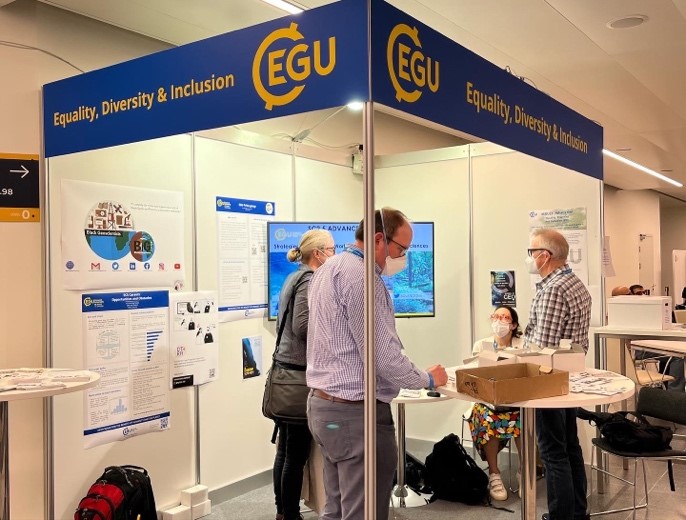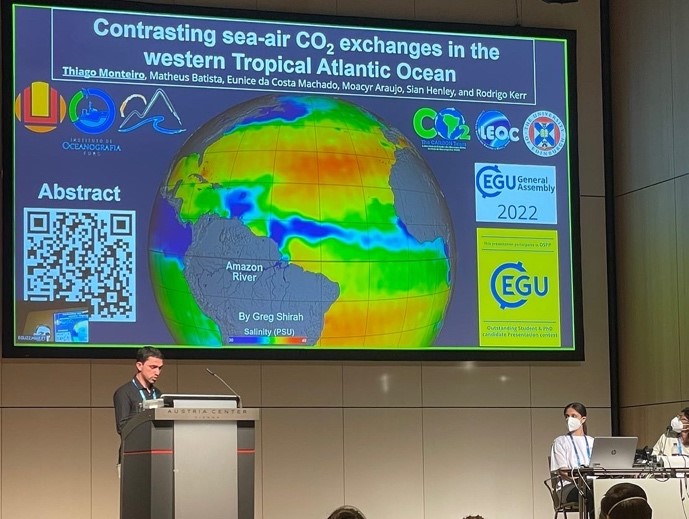EGU General Assembly 2022
Thiago Monteiro
The University of Edinburgh

I am very grateful to the Challenger Society of Marine Science for granting me the travel award to attend the EGU General Assembly 2022 in Vienna – Austria from 23 to 27 May 2022. The EGU Assembly 2022 was the first in-person meeting of the EGU since the start of the COVID-19 pandemic and the first to deliver a fully hybrid meeting (in-person and virtual), which made the conference even bigger than previous ones. The entire Geosciences scientific community was very excited to finally be able to meet in person. So, I have no doubt that all this contributed to my experience being even more extraordinary. Indeed, this was the first major international conference I attended. Due to the interdisciplinary nature of the conference, I had the opportunity to attend d presentations on various fields of geosciences, such as the importance of the Amazon to the global climate, the changes that deep and bottom water masses are experiencing from the North Atlantic to Antarctica, and how the carbon cycle has responded to climate change on regional and global scales. In addition, I was very happy to see that the scientific community has recognized and made efforts to minimize social problems that unfortunately are realities in academia. So, the discussions about inclusion, diversity and equality were very inspiring to me.
Caption: Site with information on equality, diversity, and inclusion in geosciences.
During the conference I also had the opportunity to meet people who are working in the same field of research as me and to attend several talks that gave me many ideas for adaptations in my studies and even ideas for future studies. In some of these talks I had the happy opportunity to find solutions to some problems I was facing in the elaboration of the second paper of my thesis and to get explanations for some results I already had. My presentation was on the very first day and it was about “Contrasting sea-air CO2 exchanges in the western Tropical Atlantic Ocean”. In this study we explain why there is divergence between the estimated sea-air CO2 fluxes in the western Tropical Atlantic Ocean. And the answer is basically because this region can be split into three sub-regions with different behaviours in terms of sea-air CO2 exchanges and, therefore, this should be considered in the sample design of future studies. It was quite exciting because an important researcher on the carbon cycle (and who is always present in my gallery of paper) was present and asked me a question. Conferences also give us excellent opportunities to meet people and see others with whom we may be able to collaborate in the future. And indeed, I had the chance to meet a lot of people and colleagues during this week, share experiences and opportunities for the future.
I am a PhD student in Brazil, and I am spending a year as a visiting PhD student at the University of Edinburgh. During this a-year period I have been trying to visit research centres in the UK, presenting our studies and exchanging experiences with colleagues in the community. This has it enriching for my personal and scientific life. And for sure attending EGU General Assembly 2022 was one of the best experiences I had during my a-year time here. So, I would again like to thank the Challenger Society very much for providing me with this opportunity.
Caption: Awardee during his talk at EGU General Assembly 2022.
Awardee profile: I am an oceanographer (Federal University of Pará, Brazil), with a master's degree in oceanography and now as a PhD student at the Federal University of Rio Grande (Brazil). I am currently spending a year as a visiting PhD student at the University of Edinburgh. Since my master's degree I have been studying the marine carbonate system and CO2 fluxes in Antarctic. The main objective of my thesis is to investigate how the mixing of water masses with distinct biogeochemical characteristics influences the storage of anthropogenic carbon in the North Antarctic Peninsula. Here, at the University of Edinburgh, I am improving my understanding of marine biogeochemistry, particularly on macronutrients in Antarctica. In addition, I have participated in studies on the carbonate system in the tropical and south Atlantic Ocean and in estuarine environments. I am very excited about interdisciplinary studies, so I am very interested in building collaborations that can allow us to study marine environments in different ways.
Latest News
Royal Society Publishing Photography Competition 2025
Please see a message from the Royal Society below:
We are delighted to announce that the 2025 Competition is now open for entries until 15 August for a chance to win £1000! The competition celebrates the power of photography in conveying the wonder of science happening all around us and photographs can be submitted in the categories of: Astronomy, Behaviour, Earth Science and Climatology, Ecology and Environmental Science, and Microimaging.
The competition is free to enter and open to anyone studying or working in science at graduate level or above. Category winners will receive a one-year membership to the Royal Photographic Society and the overall winner will receive a grand prize of £1,000. Find out more: https://bit.ly/RSPphotocomp
October 2025 MEDIN Workshop: Marine Data Management, Governance and the MEDIN toolset
The Marine Environmental Data and Information Network (MEDIN) are pleased to announce that registration is now open for the next occurrence of our popular free online training workshop: ‘Marine Data Management, Governance and the MEDIN toolset’ on the 13th – 17th October 2025 on OceanTeacher Global Academy.
Marine Data Management, Governance and the MEDIN toolset
The Marine Environmental Data and Information Network (MEDIN) and OceanWise are delighted to invite you to attend our popular free online training workshop: ‘Marine Data Management, Governance and the MEDIN toolset’ on the 19th – 23rd of May 2025.
